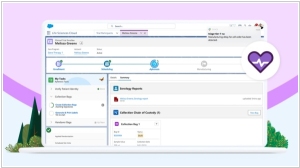Top 10: Code hosting services
Updated: August 01, 2023
Code hosting refers to the practice of storing and managing software code repositories on cloud-based platforms, providing a centralized and collaborative environment for developers to work on projects. Code hosting platforms offer version control systems, such as Git or Mercurial, allowing developers to track changes, manage code history, and collaborate on code changes efficiently. These platforms often provide web-based interfaces that enable developers to review, comment on, and merge code changes through pull requests or merge requests. Code hosting fosters teamwork, transparency, and code quality by facilitating code reviews, providing issue tracking, and ensuring that all team members have access to the latest code versions. By leveraging code hosting platforms, developers can collaborate seamlessly, improve development workflows, and contribute to the success of software projects in a secure and efficient manner.
Some of the most popular code hosting platforms are listed below.
See also: Top 10 Source Code Management tools
See also: Top 10 Source Code Management tools
2018. GitHub business users now get access to public repos

GitHub, the code hosting service recently acquired by Microsoft, is introducing several new features for its business users, enhancing their ability to access public repositories on the platform. Previously, users on the hosted Business Cloud and self-hosted Enterprise environments lacked direct access to the vast array of public open-source repositories available on GitHub. However, with the latest update, this limitation is being addressed, enabling business users to extend their reach beyond their firewalls and actively engage and collaborate with the wider GitHub community. Additionally, GitHub now provides its business and enterprise users with a new unified search functionality, allowing them to explore both their internal repositories and open-source ones.
2016. GitHub gets project management tool

GitHub has introduced its "most significant update" to its Git-based code hosting service. This update expands GitHub's offerings beyond code hosting and includes basic project management features reminiscent of a Kanban board. While GitHub has always supported integrations with various project management tools, this update introduces a built-in tool that allows users to organize cards, such as pull requests, issues, and notes, into customizable columns like "in-progress," "done," or any other preferred labels. Similar to platforms like Trello, users can easily drag and drop cards between columns to reflect changes in project status. This enhancement enables GitHub to provide a more comprehensive solution for project management in addition to its existing code hosting capabilities.
2014. GitHub Enterprise now works on Amazon Web Services

The latest release of code repository software, GitHub Enterprise 2.0, introduces the capability to leverage the service's virtual machines to establish a highly scalable version of GitHub's services on Amazon Web Services, the cloud computing platform provided by Amazon. This update encompasses various features, regardless of whether it is hosted on AWS or any other platform. One significant enhancement is the ability for companies to utilize their existing single sign-on solution with GitHub. They can now employ LDAP or SAML compatible solutions to achieve this integration. Furthermore, the update introduces security audit logs, enabling administrators to closely monitor user activities and facilitate auditing of account, team, and repository access over time.
2011. JIRA, Confluence available as SaaS services
Atlassian has launched the new SaaS service Atlassian OnDemand, which includes its popular tools for managing software development projects: JIRA (issue-tracker), Confluence (wiki), GreenHopper (Agile Project Management), Bonfire (bug reporter), FishEye (code manager), Crucible (code review) and Bamboo (integration). All products in the SaaS version provide the full functionality of the installable counterparts. There are only minimal restrictions on the tool integration and use of the custom plug-ins. You can turn on/off the tools as needed. The service pricing is traditional for Atlassian - "everything for $10 for 10 users." Recall that the company is also selling the 10-user leniences of the same installable products for $10. So you can either buy the product for $10, or rent it for $10/month. ***


